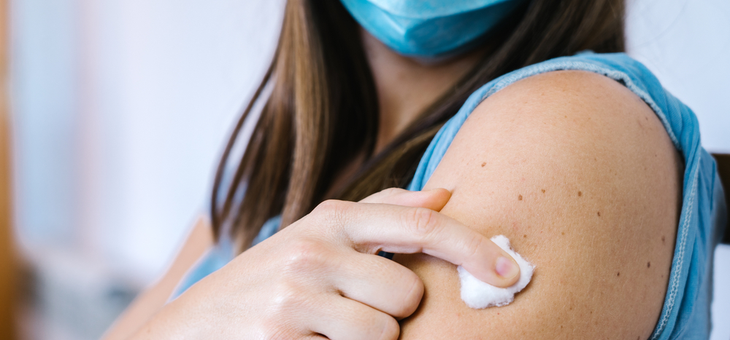By now, you may be prepared for your COVID-19 vaccination. But what of the period just after you receive the shot?
Getting an injection that activates your immune system is no minor matter, so be aware of what to expect.
Read more: Preparing for the COVID vaccination
The experts on this are the Americans, who have administered so many more vaccines than us.
The US Centers for Disease Control and Prevention (CDC) says you should wait at least 15 minutes before leaving the vaccination site to make sure you have medical expertise nearby in case of an allergic reaction. The CDC also urges you to talk to your doctor before taking certain over-the-counter medicines following vaccination if you have a medical condition. These drugs include:
- paracetamol
- antihistamines
- aspirin
- ibuprofen
Those without medical conditions can take these medications to reduce post-vaccination side-effects, such as soreness in the arm.
The federal government advises that the following symptoms can be expected as minor side-effects of the Pfizer vaccination: pain or swelling at the injection site; tiredness; headache; muscle pain; fever and chills; and joint pain. For the AstraZeneca jab, you can add nausea.
These side-effects should go away within two days. You should seek medical attention after your vaccination if:
- you think you are having an allergic reaction. Call 000 if you experience severe symptoms, such as difficulty breathing, wheezing, a fast heartbeat or you collapse
- you are worried about a potential side-effect or have new or unexpected symptoms
- you have an expected side-effect of the vaccine that has not gone away after a few days.
Read more: Vaccination no guarantee of open borders
Alcohol
You don’t need to avoid alcohol after getting your shot. There is no evidence to show that alcohol consumption will influence how the vaccine works.
Dr William Moss, executive director of the International Vaccine Access Center at Johns Hopkins, says: “Excessive alcohol consumption is bad for many reasons, but casual or moderate alcohol consumption will not impact the response to COVID-19 vaccines.”
Exercise
Exercise can either support or deplete your immune system.
“I would not plan on getting the vaccine within a few days of a goal event, including planned training activities,” Dr Kevin Bernstein told businessinsider.com.au.
But you should also avoid being sedentary.
“I would still recommend at least getting outside for a nice walk and continuing to stay hydrated while your immune system works its magic,” says Dr Bernstein.
It helps to be reasonably active before and after your vaccination but listen to your body and don’t overtrain if you are fatigued and have a fever.
Light arm exercises might help with injection site pain.
Returning to daily activities
British health authorities say you should be able to resume your normal activities if you feel well. “If your arm is particularly sore, you may find heavy lifting difficult. If you feel unwell or very tired you should rest and avoid operating machinery or driving.”
Record-keeping
If you have the AstraZeneca vaccine, it will be 12 weeks before your second dose, so make sure you document the date you must return to finish the process. The gap between jabs for the Pfizer vaccine is three weeks.
The weeks following your jab
It can take a few weeks for your body to build up its protection from the vaccine. Getting your first dose of the coronavirus vaccine does not mean you are instantly protected from the virus, so normal COVID-19 precautions should be continued. If you get COVID-19 after being vaccinated, the effects should be less severe. A full vaccination course greatly reduces your chance of becoming seriously ill. It is not yet determined how effective the vaccines are at reducing the risk of you passing on the virus.
The CDC says you should get your second shot even if you have side-effects after the first shot unless a vaccination provider or your doctor tells you not to get it.
For Australians lucky enough to be living more freely, it means we must continue washing our hands and wearing masks on public transport.
It is recommended that you wait at least 14 days after you receive the COVID-19 vaccine to get the flu vaccine. The same applies if you have a flu vaccine first; you should wait at least 14 days before being vaccinated against COVID-19.
American radiologists are suggesting women in need of a mammogram either schedule your mammogram before your vaccine, or four to six weeks afterward, because the vaccines can cause swollen lymph nodes in some people, which make diagnosis more difficult.
Do you know when and where you’ll get vaccinated? Do you know enough about how vaccinations work?
Read more: Are over-50s being treated as second class citizens?
If you enjoy our content, don’t keep it to yourself. Share our free eNews with your friends and encourage them to sign up.

